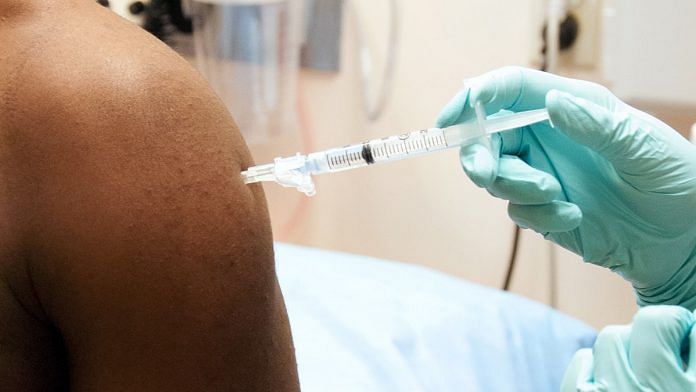New Delhi: As India prepares to launch its largest vaccination programme, likely with a Covid-19 vaccine that has only been given expedited approval because of the current pandemic situation, the Government of India has begun to put in place an elaborate mechanism for monitoring adverse events following immunisation (AEFI).
The Covid vaccination programme will be unique also because it will only target adults, and states have been asked to rapidly detect and promptly respond to any AEFIs to ensure public confidence in the new vaccine does not wane.
Potential vaccinators are being trained with detailed instructions on infection prevention and control practices and management of minor, severe or serious AEFIs.
The guidelines on vaccination shared with the states also deal with this at great length. States have been asked to identify at least one AEFI management centre in each block, which can be a primary health centre or a community health centre, a district hospital or even a private health facility that has medical officers and paramedical staff.
Every vaccination site will be linked to a designated AEFI management centre. All such adverse events will be reported through the Co-Win application developed to monitor and manage the Covid-19 vaccination programme.
Also read: How to ensure smooth Covid vaccine rollout — India’s polio programme has some lessons
Why so many new plans?
The question is why does a vaccine that will go through the scrutiny of the Drug Controller General of India for safety, immunogenicity and efficacy need such well-laid plans for AEFI management when India already has a system in place as part of its Universal Immunisation Programme.
India’s Universal Immunisation Programme deals with about 2.64 crore mothers and babies every year, but the Covid-19 vaccination drive with the first four priority groups comprising 30 crore people — all adults, some with comorbidities — is the first such exercise ever undertaken in the country.
Asked why the new AEFI plans were required, government think-tank NITI Aayog’s Member (Health) Dr V.K. Paul gave three reasons. “First, this is an adult vaccine; our AEFI system was targeted to children and women. Those vaccinations take place in a certain way starting with hospitals and then into the community. When you deal with adults, the practical aspects of physical location have to be tackled,” Paul said.
“Second, these vaccinations are new platforms; in fact, multiple new platforms. That brings in a different complexity. Also, if an emergency use authorisation (EUA) is being given, please remember that it is an emergency authorisation that brings in (requirement for) more responsible behaviour,” he explained.
For a new vaccine, the NITI Aayog member added, there are also newer kinds of adverse events that one may be looking at.
“AEFI for a new vaccine means there are always new aspects, new situations, new side effects that have to be kept in mind. Some vaccines will cause allergic reaction; others will have perhaps very high fever; some others may have second day complications. Nuancing in terms of side effects for new vaccination also has to be factored in,” Paul said.
“Adult vaccination, EUA, and above all, this time there is a very large number of beneficiaries to be tackled in a short period in mission mode. There is a need to build on standard principles of AEFI and make it specific to full dimension of requirements of this particular set of vaccines,” he added.
The reporting and monitoring of AEFIs during vaccination will also be used to generate post-marketing surveillance data of the vaccine.
Also read: 5-member teams, mobile sites, avoid ‘mixing’ — Centre’s Covid vaccine guidelines to states
All beneficiaries to be counselled
While vaccinators have already been trained to identify signs of AEFI and deal with common occurrences like anaphylactic shock, the guidelines for Covid-19 vaccination also lay down that every beneficiary should be counselled about the possible side-effects.
“All beneficiaries must be counselled about adverse events which may occur after Covid-19 vaccine. These are expected to be minor events such as local pain and swelling, and mild to moderate fever, etc. However, the list of expected events could be different based on the safety profile of the Covid-19 vaccine(s) that finally get(s) approved for use,” the document released last week said.
All serious or severe AEFIs will be investigated by the district immunisation officer or the district AEFI committee.
Responding to a question about reports of a deadly fungal infection in patients who had Covid-19, Dr Paul said: “We are aware of this, we have this information. This is a fungal disease, particularly in diabetics, even in the absence of Covid. This is a devastating disease; the cure is quite difficult because there is an all-round depression (of physiological processes) in Covid, and because it is a systemic disease, it affects many organs — some more some less.”
He warned: “As we get more information on Covid, we understand new things. They (Sir Ganga Ram Hospital) have done things as per protocol. We need to be careful. This disease can be mild or asymptomatic, but can also be serious, and we are seeing complications that were not described so far.”
‘Have faith in institutions’
While giving an update about the status of vaccine approvals — Bharat Biotech, Serum Institute of India (for the Oxford-AstraZeneca vaccine) and Pfizer — have already applied for emergency use authorisation — Dr Paul reiterated his appeal to people to have faith in the country’s institutions.
“The subject expert committee in the drug controller’s office has subject experts, and also experts from diverse fields… The applications are under consideration. But this will have no effect on the vaccination timelines because this was factored in,” the NITI Aayog member said.
“EUA will be granted only after reasonable satisfaction of safety, immunogenicity and efficacy,” he insisted.
Bharat Biotech and Serum Institute have been asked to submit more data on their respective vaccines.
Also read: No pressure on drug regulator to approve Covid vaccines, says NITI Aayog member VK Paul



